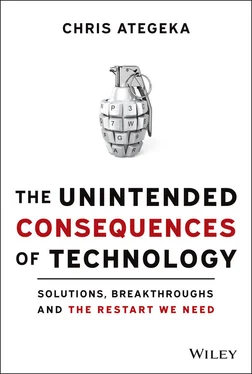Capitalism has a dynamic where entrepreneurs and firms are seeking to create and develop profitable new products that may be popular with consumers. This can lead to product development and more choice of goods.
With firms and individuals facing incentives to be innovative and work hard, this creates a climate of innovation and economic expansion. The dynamic helps to increase real GDP and can lead to improved living standards. This increased wealth enables a higher standard of living; in theory, everyone can benefit from this increased wealth, and there is a “trickle-down effect” from rich to poor.
THE UNINTENDED OR WILLFULLY IGNORED NEGATIVE CONSEQUENCES OF CAPITALISM IN THE TECHNOLOGY SECTOR
“Capitalism is the astounding belief that the wickedest of men will do the most wickedest of things for the greatest good of everyone.”
—John Maynard Keynes
There are many UCOTs related to capitalism. This section focuses on the ones with the biggest influence.
Private ownership of capital has enabled large technology firms to gain monopoly power in product and labor markets. Companies with monopoly powers—like Amazon, Apple, Google, and Facebook—have exploited their position to charge higher prices, pay lower wages to workers, avoid paying their fair share in taxes, and gain unilateral control of who they do or do not want on their platforms.
One of most recent examples is Amazon, one of the most valuable companies in the world, fighting tooth and nail to prevent its workers from forming a union. It's a battle for higher wages and improved working conditions. The company has steadfastly said its “workers don't need any union” (Greene, 2021).
In a capitalist society like the United States, there is great inequality between the owners of capital and those who work for their firms. In the current pandemic of COVID-19, for example, folks who are doing all the heavy lifting (the essential workers) under the harshest conditions are often getting paid minimum wage. Research at the Brookings Institution, a nonprofit public policy organization based in Washington, DC, titled a report “The COVID-19 Hazard Continues, But the Hazard Pay Does Not: Why America's Essential Workers Need a Raise” (Brookings Institution, 2021). As Robert Reich, a UC Berkeley professor and former Secretary of Labor pointed out, “Jeff Bezos' [the founder of Amazon] net worth in 2009 was $6,800,000,000 and $200,000,000,000 in 2020; meanwhile the Federal minimum wage in 2009 was $7.25 and is still $7.25” (Reich, 2020).
The following quote appeared in an NPR article, “There Is Rich and Then There Is Bezos Rich” (Zarroli, 2020):
“You probably think 2020 has turned out to be a pretty lousy year, what with the coronavirus pandemic, a global recession and unceasing partisan warfare in Washington.
Then again, you're not Jeff Bezos or Elon Musk.
Thanks to soaring stock prices at Tesla, the company Musk founded, the quirky South African-born entrepreneur has seen his personal wealth soar to unimaginable heights of $147 billion [less than a month later this number was $188 billion making him the richest person in the world].
In fact, Musk is one of only five centibillionaires in the world, or someone with a personal fortune exceeding $100 billion, according to the Bloomberg Billionaires Index.”
This is not sustainable. If we have learned anything from nature and the laws of physics, nothing grows forever. Whatever goes up will peak, and then it has to come down! The bottom line is that there are a limited number of resources on this planet. How we share and distribute these resources to all living things is a matter of importance that affects our future, and should affect our conscience. Unbridled capitalism is not sustainable, nor is it humane.
Technology companies that greatly benefit from the free market have ignored the negative effects of their creations. They mostly care about maximizing profit for their shareholders and choose to ignore negative externalities, such as the horrifying inequalities and pollution from production that harm living standards and living things.
Sadly, that same free-market economy continuously underprovides goods with positive externalities, such as health, public transport, and education. These goods are mostly deemed the work of philanthropy or government. This has led to an inefficient allocation of resources. Even ardent supporters of capitalism admit that government provision of certain public goods and public services is essential to maximizing the potential of a capitalist society.
Inherited Wealth and Wealth Inequality
Capitalism is based on the legal right to private property and the ability to pass on wealth to future generations. Capitalists argue that a capitalist society is fair because you gain the rewards of your hard work. But often people are rich simply because they inherit wealth or are born into a privileged class. Therefore, a capitalist society not only fails to create equality of outcome but also fails to provide equality of opportunity. Inequality creates social division. Societies that are highly unequal create resentment and social division. They do not last.
For example, in late 2013 we saw the rise of “tech bus protests” in the San Francisco Bay area, where unhappy community-based activists threw eggs and other objects at the shuttle buses used to transport employees of local giant tech companies. These protests became widely publicized. The tech buses were called “Google buses,” although that term is pars pro toto (part of the whole), in that many other tech companies such as Apple, Facebook, Yahoo, and Genentech also have private shuttle services. The buses were used to ferry only tech company employees from their homes in San Francisco and Oakland to corporate campuses in Silicon Valley, about 40 miles (64 km) south.
The people involved in the protests viewed the buses as symbols of gentrification and displacement in a city where rapid growth in the tech sector and insufficient new housing construction led to increasing rent and housing prices, where natives and residents are getting pushed out.
I predict that soon we will see a larger metaphorical “egging” of big tech companies. It's obscene for one man to have $200 billion dollars while a single mom of three holds three jobs at $7.50 an hour, working for that same man as she attempts to make ends meet. It is also obscene that in 2019, the average top CEO's pay increased 14% from 2018 to $21.3 million. Sundar Pichai, the CEO of Google's parent company, Alphabet, earned $280,621,552 in total compensation—more than 1,000 times the income of a median company employee (As You Sow, 2021).
Some people would argue that the wealthy person worked hard and created the company, so they deserve all this reward. Also, if they hadn't created the company, this mom wouldn't have the job she has. The rich represent the “hard work” of years of sacrifice from themselves, their families, and others around them. Is it fair to say these people deserve their money because they worked hard for it? This is a fair argument, and is in fact one of the biggest incentives of capitalism.
However, I counter that argument with a question: is it possible for the wealthy person to get disproportionately large payouts for all their hard work without paying starvation wages to their employees? Or is it possible to have an equitable redistribution of that wealth among all parties involved in creating it? I think it's possible! I and many others would love to see more of this thinking put into practice.
Читать дальше












